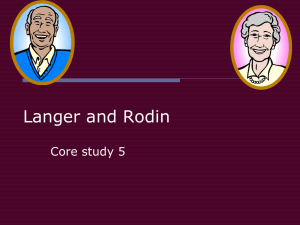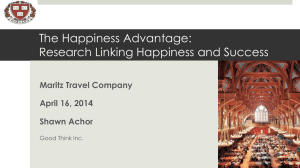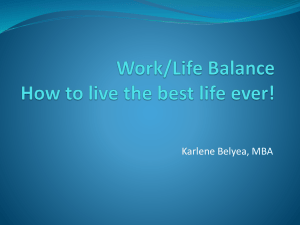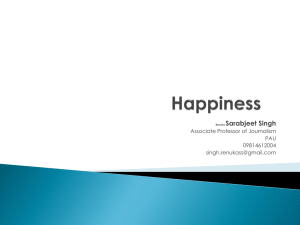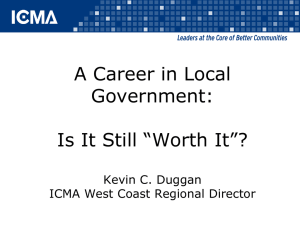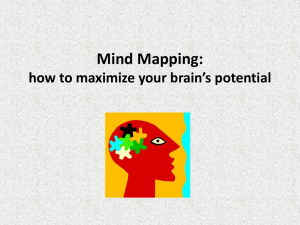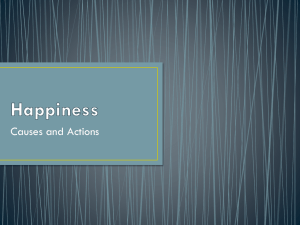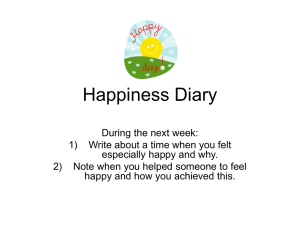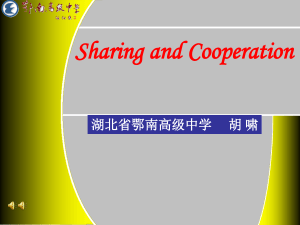Case Studies On Dilemmas
advertisement
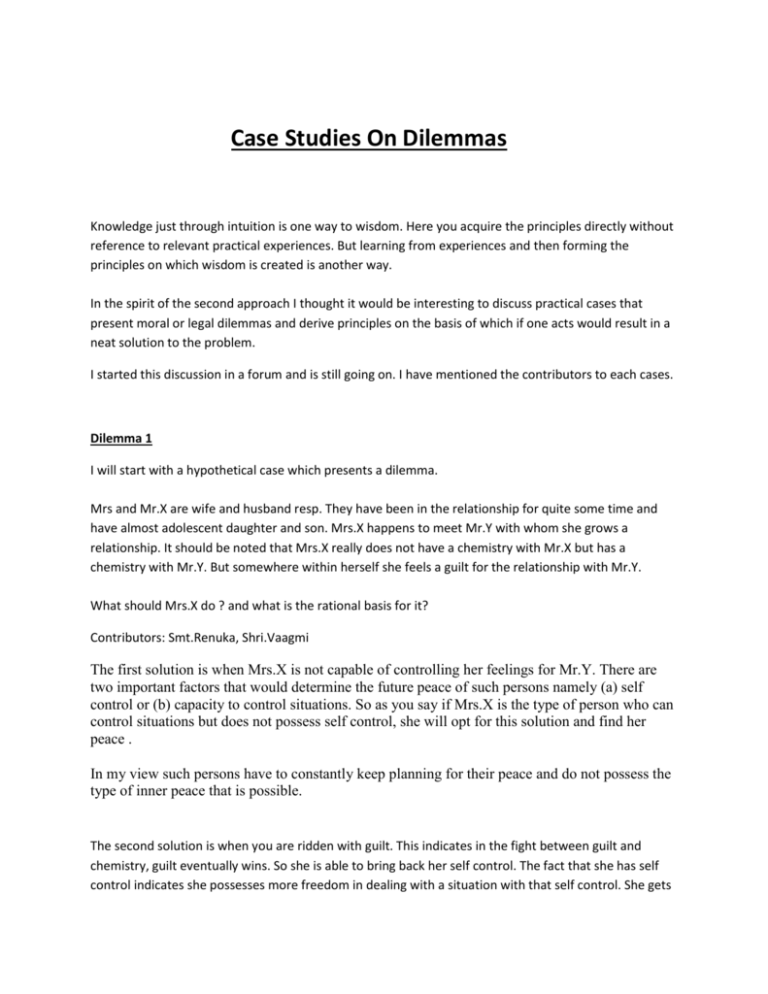
Case Studies On Dilemmas Knowledge just through intuition is one way to wisdom. Here you acquire the principles directly without reference to relevant practical experiences. But learning from experiences and then forming the principles on which wisdom is created is another way. In the spirit of the second approach I thought it would be interesting to discuss practical cases that present moral or legal dilemmas and derive principles on the basis of which if one acts would result in a neat solution to the problem. I started this discussion in a forum and is still going on. I have mentioned the contributors to each cases. Dilemma 1 I will start with a hypothetical case which presents a dilemma. Mrs and Mr.X are wife and husband resp. They have been in the relationship for quite some time and have almost adolescent daughter and son. Mrs.X happens to meet Mr.Y with whom she grows a relationship. It should be noted that Mrs.X really does not have a chemistry with Mr.X but has a chemistry with Mr.Y. But somewhere within herself she feels a guilt for the relationship with Mr.Y. What should Mrs.X do ? and what is the rational basis for it? Contributors: Smt.Renuka, Shri.Vaagmi The first solution is when Mrs.X is not capable of controlling her feelings for Mr.Y. There are two important factors that would determine the future peace of such persons namely (a) self control or (b) capacity to control situations. So as you say if Mrs.X is the type of person who can control situations but does not possess self control, she will opt for this solution and find her peace . In my view such persons have to constantly keep planning for their peace and do not possess the type of inner peace that is possible. The second solution is when you are ridden with guilt. This indicates in the fight between guilt and chemistry, guilt eventually wins. So she is able to bring back her self control. The fact that she has self control indicates she possesses more freedom in dealing with a situation with that self control. She gets influenced less by external factors than if she had been a type who choose the first solution. So the fundamental principle I am putting forth is that one's inner happiness and its quality depends a lot on the self control he or she exercises. It actually starts from your principle that each person tries to find his or her own level of happiness but adds that there are differences in the quality of happiness that each approach offers. So what I was thinking is that once we lay down the fundamental principles on what brings peace and happiness which is what every solution eventually strives for, we can branch off from there and become more specific on the principles and eventually actions that would lead to peace and happiness. More views on this case: If Mr. Y and Mrs.X are able to enjoy music over static they can continue the relationship for ever leaving Mr X behind so that he can look for some other partner to work on a new oscillator to start a new musical effort. There is nothing to feel guilty about it. We, in fact, offer oblations during tharpanam to the jnaatha ajnaatha pithrus. Westerners have got rid of this guilt part of it quite easily as it is their culture. The effort there it appears is to create and transmit music always. My Response: Guilt comes from within. t depends on the mental make up of the person. It can be obscured just like all morally right things can be, but the point is it is a naturally occurring feeling. A person who feels guilt for doing something morally wrong is still listening to the conscience. By overriding guilt the music will only become discordant with time. In my view it cannot be music always. Definitely not good quality music. It is my view that the western notion of equality and its notion of other values alone are not enough for an exploitation free society. In the same way a society which talks of only values cannot give an exploitation free society. In the former case, the way it has been practiced, everything reduces to just performing the right behavior and no care for right intent. It is just being politically correct and pragmatic. In the later, everything eventually reduces to meaningless rituals and superstitions. Both lead to exploitation. It is between these two groups that we see fights very often these days. Pragmatism and values have to be integrated. The problem is people have found it easy to practice pragmatism alone or preach values alone without bothering about the other. The mix of both is what gives rise to character and integrity. It gives stability and harmony to society. We need to think about ways to stress about the importance of both so that one does not compromise on one or the other. As an individual this would seem to be a daunting task but would not be so if the society realizes this as a whole. Spiritual leaders, politicians and social workers have to understand this and be involved to make the mass change possible. Dilemma 2: Women are not allowed inside certain temples. So there seems to be a case of discrimination. We have been recently seeing events where some women's organizations have been fighting for the right to worship. On the other side it is said something which has been a part of tradition cannot be given up. Contributors: Smt Renuka, Smt. Janaki Jumbunathan Regarding unsettled issues such as existence of God, both the sides have to be accommodated. Spiritual people base their beliefs on their experiences or faith. Scientists base their beliefs on physically verifiable evidence. For the former the latter is an illusion and for the latter the former is just imagination. What I suggest is in resolving issues, spiritual people should provide a moral basis for their cases and the secular ones "analytical logic" if I may use that phrase. In the case of the temple for example if traditionalists are able to show that a higher dharma is upheld because of the practice then that should provide sufficient grounds for the continuation of the practice. Otherwise not. Dilemma 3: Is there a need to engage in productive money earning exercise to be happy. If not why work for a living? I find those who have not earned a penny in a lifetime and lived off others are happier than those who have slogged a life time to earn a few rupees. Should we be happy beggars than unhappy wealthy people? Dilemma posed by Shri.Krish Contributors:Smt.Renuka, Shri.Vaagmi, Shri.Krish The quality of life depends on the logic you use in your life. The question is do you prefer pleasure or mental happiness. The answer would be mental happiness without any qualification. Even during pleasure there is mental happiness. So there is nothing to choose here. You just have to realize the truth. A subtle point to note is that one who seeks pleasure actually seeks mental happiness. Consider this. If we take away his mental happiness but let him have the pleasure, will it be acceptable for him? But the reverse case of mental happiness without pleasure is quite a satisfactory one. This in my view settles the issue. So one should follow a recipe that tries to maximize happiness and not one that tries to maximize physical comforts. The most basic and the lowest level of happiness is when your security of life is not threatened. Food, shelter and clothing gives you this. The next level of happiness happens when you start providing for yourself more than the above needs. This when you start reaching the normal standards of living. You not only feel secure about food, clothing and shelter but also comfortable. From this point onwards it seems that material aspect fail to conclusively increase the quality of happiness. You can strive to increase the happiness by trying to be wealthier or popular. The happiness is created by the attention of other people towards you. This is a mixed case. It can increase the level of happiness or can decrease it because negative factors come into play. A more stable level of happiness is reached by intellectual accomplishments i.e., fame. But when your mind develops to a stage where it considers helping others at par with attaining personal benefits, the quality of happiness changes in a real way. As this attitude keeps intensifying, the happiness keeps increasing. But the tragedy is, in reality we find very few of such people because of the state of affairs of our times. To sum up I would say there are two distinct levels of happiness , one occurring by satisfaction of needs of self and the other when you go beyond them. Dilemma 4 Here is a bender of a dilemma. Definitely not for dabblers! Draupadi's dilemma in marrying all the pandavas after Arjuna won her. Should she have done that? Before embarking on the draupadi dilemma, let me pose questions which brings out certain principles Here are they: 1.Do you think lying is immoral? 2. Would you lie to save the life of a person? 3. what if the person you are trying to save is wicked? Here are my views. Lying is immoral when there is no moral basis to utter it. It is generally not as straightforward as this. The situation becomes complicated when there are two or more dharmas at play. The second question reflects this. Then you have to see which is the higher dharma among the two and perform it. So in general I would lie to save the life of a person when somebody is coming after him to kill him. The third question complicates this even further. Let us make it simpler. Would you be concerned for the life of a wicked person? The natural reaction is no because he is likely to corrupt or harm others in some way. But look at it this way. The person presents a problem. If one can find solution to a problem there is permanent cure to it unlike trying to suppress it by not saving the wicked person. Can you cure a wicked person? That is what God does all the time through the various events that happen in one's life and the various personal experiences one has , the wicked person also is set right. So a person at the level of the highest dharma would not hesitate to save the wicked person because he knows that the person can be corrected. But in general, if you do not find a person at the highest level of dharma , the ideal solution would be to first eliminate the symptoms and still work towards a permanent cure. Coming to the draupadi dilemma, typical discussions present the patent aspects of polyandry and do not give any insights into the delicacies of the problem. Let us talk about polyandry first. Does it violate any dharma? I think so because anything that kindles the six enemies of the mind is against dharma. An average woman with more than one husband gives plenty of room for kindling almost all the six enemies of mind to an undue extent assuming average husbands. The same may happen in polygamy but it is worse in polyandry. But here is my analysis of why such righteous people as kunti, pandavas , draupadi and the Lord Himself consented for such a marriage. The background of the problem is while the pandavas were in exile, there was an agreement of sharing anything that they brought home. It so happened in the case of Draupadi who was brought home that Kunti unknowingly told the pandavas to share what was brought. Since this is a dilemma, opposing dharmas should be at work. So what are the opposing dharmas at work? Th first one is having to honor the promise made among themselves and the word of the mother. The opposing adharma is a woman marrying five men. The only way this can be satisfactorily resolved is when the adharma is not seen as such. So going by the rationale that adharma is something that kindles the six enemies, would this situation have kindled the six enemies in the pandavas or in Draupadi. The answer is no since all the six are so righteous that it would not have an impact on the six enemies of mind. Thus in my view Draupadi or others did not violate any dharma. The aspect of sex should not even be discussed because it creates an opacity that can make it difficult to properly interpret the case. Note: If there is adharma in performing something it can be still done, provided you are be to use a higher dharma in that act. In the case of Draupadi's dilemma it happens that there is no adharma. Rationale for opposing polyandry and polygamy Even a celibate can have the emotions Consider these two cases: 1. Two heterosexual couples 2. Two men and one wife. In the first case it is the normal emotions depending the nature of those people that are created and displayed In the second case, the ego of the two men clash. When ego clashes all the emotions go awry. The wife may show partiality. The guilt feeling will not be so strong because both are husbands unlike in the case where she is emotionally attached to a person other than her husband. This can affect her own psyche in a negative way because generally one negative trait leads to another. Sex plays a greeter role because two men are involved. So what happens in polyandry is that the external aspect of the relationship is highlighted more than connecting at the inner level. A woman being more inward seeking than men is more affected than a man who has polygamous relationship. Let me state the cardinal difference between happiness from the inner self and happiness from the external world. In the former you get happiness by focusing on the whole. The more you compartmentalize the more you lose the happiness. In the latter you get happiness by spending your energy on a number of things. The more the variety or more the differences, the more happiness it gives you. So while it is the unchanging that gives you inner happiness , it is the constantly changing that gives external happiness. They are different levels of happiness. Are you able to see what woman in a polyandrous situation loses where there is a lot of efforts that needs to be spent on compartmentalizing? Dilemma 5 Mr.X is a rich and powerful man in his village. By catering to the weaknesses of the people, he was able to keep everybody under his control. However Mr.Y is an incorruptible person and wanted to sway the people away from the bad influences of X. He sought to inculcate independent thinking in people. This implied giving up short term pleasures and disciplined practice of the prescriptions of Y. How can Y accomplish the difficult task? Note: A good and practical solution can help in weaning people away from unprincipled and corrupt politicians. Here's my solution: The general belief among people is that everyone will have weaknesses and succumb to them. People start believing in you when you lead by example. The fact that Y is incorruptible makes the matter easy for him. He has to show that he is above the intoxicating effects of money, women or power. If he can do that people will definitely listen to him as good appeals to the inner self of everyone. People have shunned it because it doesn't seem to be practical to be good. But X will do all he can with his power and money to prevent this from happening. Being good in any situation is being divine. So I think the machinations of X will eventually be overcome. Nobody wants to live in chaos and disorder. Our moral laxity and compromise of principles has led to a chaotic world and chaos cannot be overcome by force . It will only lead to more chaos. We have to think intelligently and that means setting right our own ways and the problems will disappear by themselves without additional efforts. So politicians who are like X will have to do a lot of introspection and act in a way that does not belie good principles. More on the case: Y needs to adopt a two pronged approach. He should appeal to the minds of the people though that by itself is not enough. He should show the viability of what he says by his actions. Only when teachings are integrated with actions, they yield the desired results. That is teaching by example. In fact it should be beyond that. People should be able to follow it themselves. A novel way of implementing the approach is that he can ask the people themselves to be teachers to other people. You learn most effectively when you teach. When people try to teach, they really try to think on their own and that is the most authentic way of learning. Actually X and Y follow different routes to self realization. People of the type of X want to control the external world and people of the type of Y want the inner self to be in control. Y can actually try to convince the people of his philosophy this way: What does one gain by comforts and pleasures? The answer is the type of happiness physical comforts give. Is there any constraint on that happiness? The answer is yes. The source of comforts and pleasures need to be constantly present. If the source dictates your happiness , are you not imprisoned by it? Try to imagine that you are free from its influence. Are you not able to visualize a higher level of happiness because you really are in control of the situation. So you still get happiness, in fact a better one and you are free from external influences. When you are free from such influences, mind works with clarity and great logic. So you are able to be better at work and relationships also. But since nature can impose a great constraint it may not be possible for all people to be able to bring back the self control. That is the reason there is the external world route. But the fact remains they cannot act the way they think and need to exhibit proper behavior. Fortunately nature provides such people with the ability to not express their emotions patently and keep them under check. Even such pseudo control would benefit such people because it prevents self destruction or unhappiness in the long term or low quality of happiness. This is the pitch in essence that Y should make to the people not tampering with the natural inclinations but appealing to use or project the positive side of it. There should be ways of implementing them . People can change by seeing Y as an example, by gaining insights through appeal to their intellect which is then able to discern personal experiences correctly or by their own thought processes by trying to understand deeper as when teaching. Those who are not able to make a real change can at least exhibit the right behavior. If x sees people changing he will also adapt and not try to exert negative influence and may even try to be positive because if he finds that people want positive things he may want to compete with Y on that objective. I think there has been some discussion and there are some principles we can distill from them. These principles can act as a solid basis for people to make their decisions and actions. But that is only the first phase. Once you are able to discern what is right for the situation, you need to put it to action. This is where the bigger challenge lies. You definitely may have to fight against those who are against it and prevail over them. If your principles or convictions are shaky you will give in easily. That is where our convictions can help us. So to put what we think into action, we have learn to cope up with the external pressure. We may have to use some practical techniques which would help us in this regard. As a matter of fact if one really has enough self control nothing else matters. But it is when we are trying to gain such control that we have to put up a fight. In the coming cases we will focus much more on how to be pragmatic about putting what we think into action.
